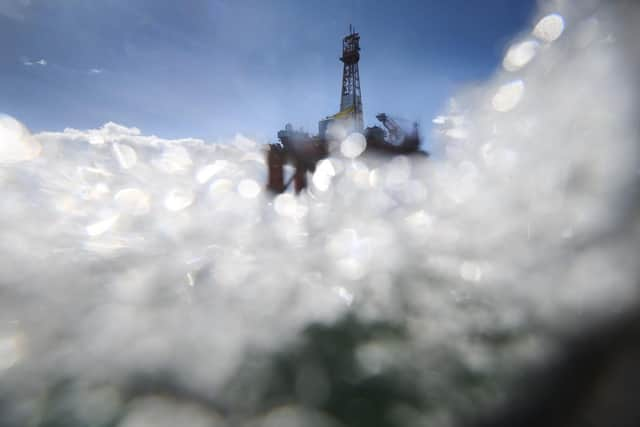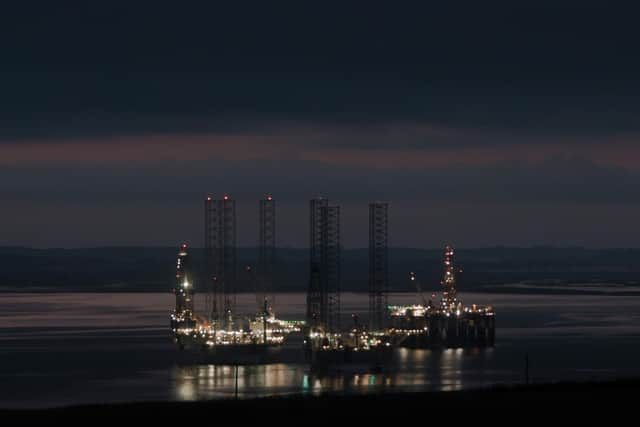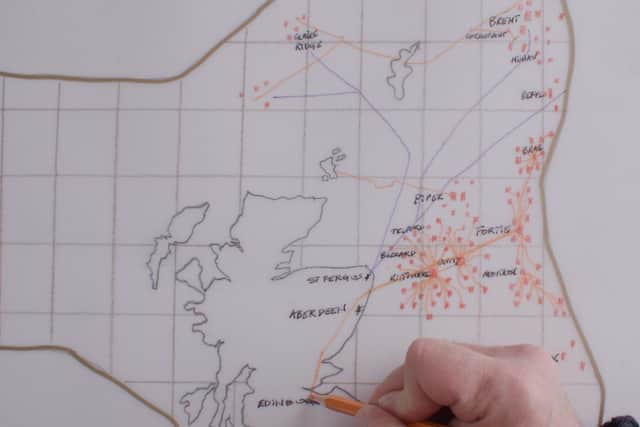Stormy waters: New Scottish film zooms in on North Sea oil and gas industry ahead of global climate summit
The release of the documentary, which premieres in Stirling this Thursday, has been carefully timed to coincide with the United Nations summit COP27.
And in today’s world – against a backdrop of climate chaos, instability in the global energy market, an international cost-of-living crisis, dangerous air pollution and growing mountains of plastic litter – its subject matter has never been more relevant.
Advertisement
Hide AdAdvertisement
Hide AdIt’s 50 years since oil production first began in the UK, with around 45 billion barrels extracted to date.
But now, with the planet in peril from climate change – primarily driven by fossil fuel use – what does the future hold for oil and gas?
The Oil Machine, by Bafta-winning director Emma Davie, explores the economic, historical and emotional entanglement with petroleum and the conflicting imperatives around the North Sea.
Davie, who lives in Argyll, is hoping the film will offer new insights into the workings of the industry and spark high-level discussion on how to wean society off its “addiction” to hydrocarbons.
She points out the ever-present nature of petroleum – it is in everything we do and everything we use, from the fuel for transport to healthcare products, packaging, clothing and technology, even the cash in our pockets.


“What we wanted to do with the film was to make visible what is invisible in our lives, but basically determines everything,” she says. “Which is the oil machine.
“But it is a very hard thing to make visible because it involves so many things that are abstract and so many things which are so much part of our lives that we can’t see them – from money to pension funds, to the plastics we use, almost everything.”
Davie insists it is even part of our emotional make-up too, which she says she believes has been “defined by this age of oil” Scotland has been living under.
Advertisement
Hide AdAdvertisement
Hide AdThe documentary features a range of contributors, including oil industry leaders, academics, environmental campaigners, lawyers and financiers.


Its release comes at a time when the UK, which still holds the UN’s COP presidency, is under fire for its commitment – or lack thereof – to climate action.
Downing Street has said new Prime Minister Rishi Sunak will not attend COP27, which begins next Sunday in Sharm El Sheikh, while his short-stay predecessor announced 100 new licences will be awarded for oil and gas fields in the North Sea.
Sir David King, former chief scientific advisor to the UK Government (from 2000–07), appears in the film. He says: “I believe that what we do over the next five years will determine the future of humanity for the next millennium.”
Another contributor is climate lawyer Tessa Khan, from Uplift. She says: “The Oil Machine is an incredibly timely look at the role that the oil and gas industry has played in shaping the UK.


“When we are in the midst of a historic energy affordability crisis and climate crisis, it’s vital that we examine the ways that the industry has become entangled with our politics. The UK Government’s recent announcement of a new oil and gas licencing round – despite the fact that it will do nothing to bring down the cost of energy and will only further fuel the climate crisis – is just the latest example of the power that the industry wields.
“There has never been a more urgent need to shift away from oil, and yet we are witnessing an industry in resurgence. The next few years will be a vital test of whether or not we can stand up to the oil machine.”
Davie adds: “We all need to talk about what’s happening under our noses and we don’t have the luxury of being ignorant about the flow of energy any more. Unfortunately, what’s happened with the current crisis in the Ukraine has become the reason for an increase in production in the North Sea and an increase in exploration under the auspices of producing cheaper energy for Britain.
Advertisement
Hide AdAdvertisement
Hide Ad“But the fact is, at least 80 per cent of the oil we produce – according to the statistics I’ve read – is exported. If that is the case, then it’s not the UK that would benefit. And we’re talking about this being so far down the line that it would mean we would still be drilling for oil in 2050, and by then we should be at net zero. It basically goes against all that has been agreed by the UK and Scottish governments in terms of pledges.”
She says the film is “not about getting at anybody”, it’s saying “the facts need to be laid out for people and proper discussion is needed”.
The film asks whether and how this machine that is the oil industry can be tamed, dismantled or repurposed to benefit society and the environment.


“It feels to me that we’re still at a pivotal point in terms of making decisions that could affect the future,” she says. “And nobody should think that we can’t do anything. We don’t really have that option as the human race.
“It concerns every single one of us in the same way, and I don’t think we have the luxury of demonising anyone in this discussion. Everybody needs to be involved and it needs to be a high-level discussion. All areas of society need to be involved. This is really what we’re trying to do with the film.”
Audiences are being encouraged to organise engagement events alongside screenings across the county and to swap ideas and feedback with the production team as part of a national campaign that aims to open up dialogue on how to transition away from an oil-based economy.
The Oil Machine is a Sonja Henrici Creates Production for BBC Scotland, supported by the National Lottery through Screen Scotland. The film is in UK cinemas from November 3 – see www.theoilmachine.org for more details.
Comments
Want to join the conversation? Please or to comment on this article.